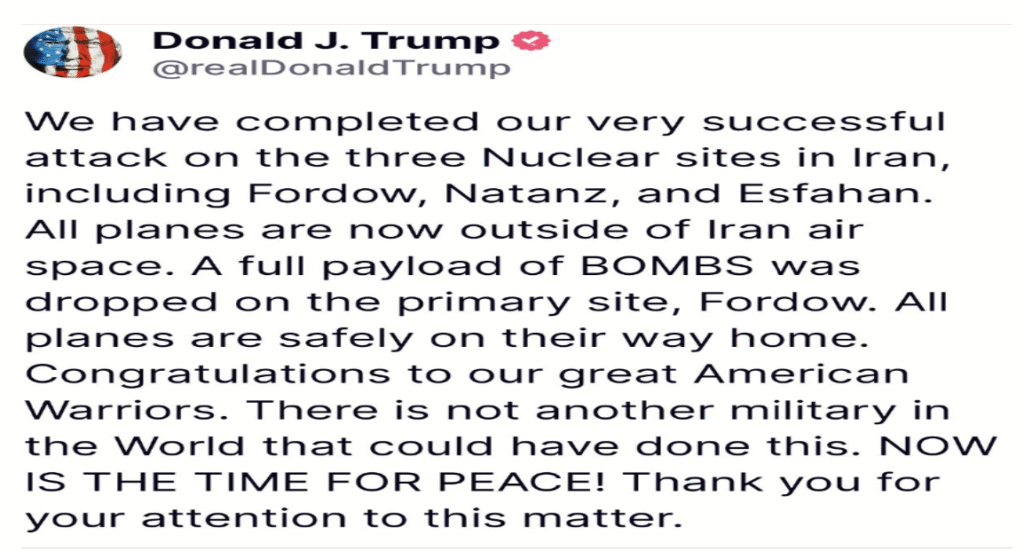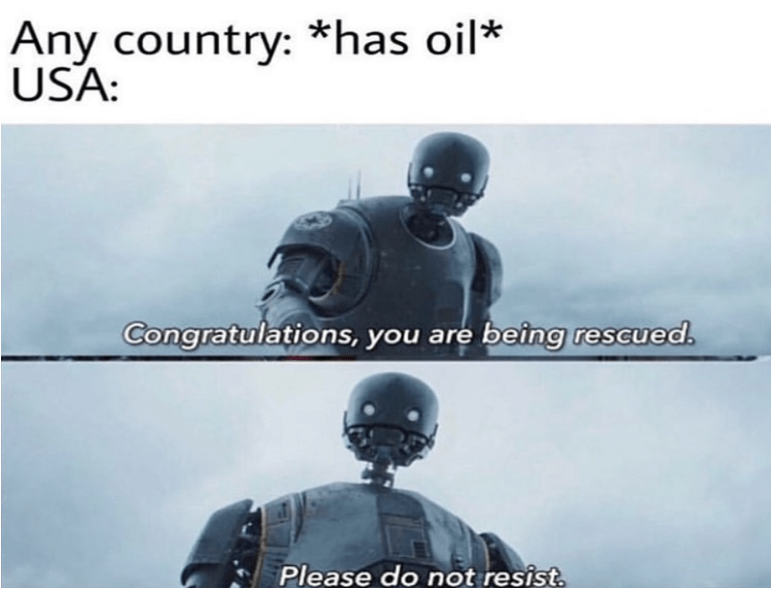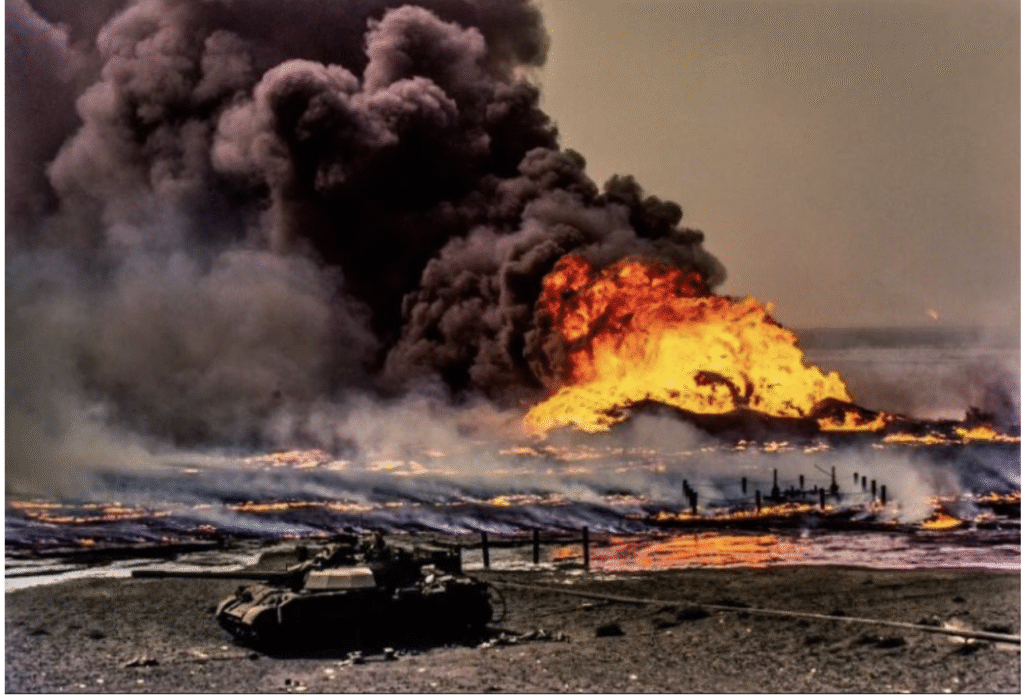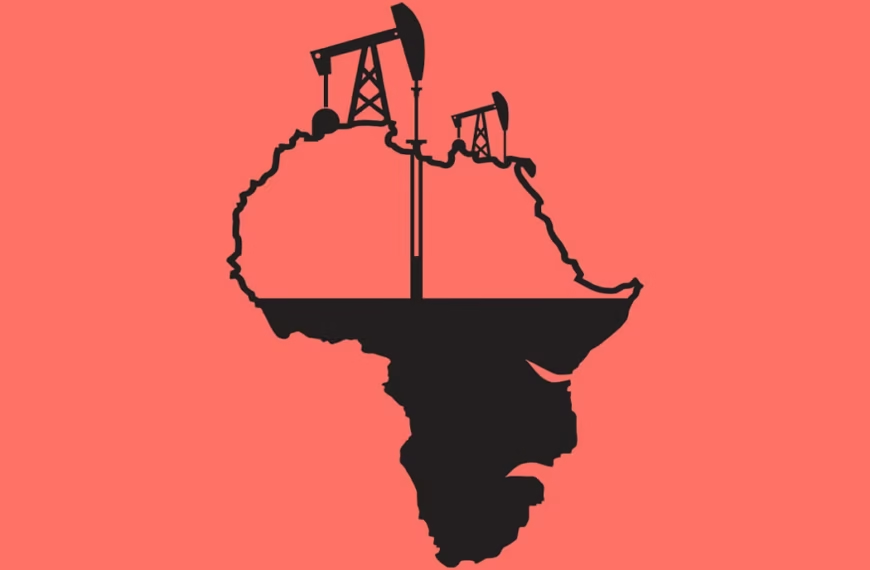Prisha Khandelwal
23rd June 2025

The Great Peacekeeper’s War Plan
Nothing screams “peace” quite like a preemptive war. In a recent show of bravado, Donald Trump hinted at the possibility of military action against Iran, under the ever-familiar guise of “protecting American interests” and “testing threats.” The irony? Declaring war in the name of peace is like setting your house on fire to check the strength of your fire extinguisher. The former hints on the attack on Iran, almost give flashbacks to the previous effects of the American intervention in the Vietnam War, the Korean War, their great attacks on Iraq and Afghanistan in the early 2000s, which all lead to horrific humanitarian, economic and environmental damages. If Trump, or any leader of a military-industrial nation, chooses to light this match, the global fallout won’t be limited to Iran’s borders. It will scorch economies, destabilise fragile markets, and poison ecosystems, all in the name of freedom, of course.
Oil First, Logic Later
The Strait of Hormuz, a narrow waterway off Iran’s southern coast, is one of the world’s most critical oil transit chokepoints. Roughly 20% of global oil passes through it daily. A single naval blockade or missile exchange due to military conflict in Iran would jack global oil prices overnight, just like it did during the 2019 tanker incidents, when crude jumped over 15% in days. It’s not entirely clear whether Iran has the military ability to close off the strait, but most analyses I read say that they could probably do it. For fossil fuel-reliant countries, and there are many, this means skyrocketing transport, food, and electricity costs. But hey, if the planet burns, at least Wall Street gets to ride the price surge. Welcome to the economics of modern warfare where profits for the few, fuel shortages for the rest are given more focus due to the unfortunate reliance on the hierarchy of economies in today’s world.

War: The Most Expensive Hobby on Earth
Let’s break down the numbers. The Iraq War cost the U.S. over $2.4 trillion, according to the Costs of War Project. The Death Toll estimates range from 500,000 to 1 million+ Iraqi civilians and soldiers The dmamage included vile destruction of infrastructure and gave the rise to ISIS due to a power vacuum. Another war in Iran, larger, more volatile, and more interconnected, could surpass that. And for what? A temporary ego boost? An oil tantrum? Meanwhile the average American will be stuck with inflation, tax hikes, and market uncertainty. In 2020 alone, tensions between the U.S. and Iran triggered global commodity price surges and led investors to retreat into “safe assets,” destabilizing currencies in lower-income countries. All while military contractors enjoy another bull run. Sounds sustainable, right?
Environmental Destruction: The Silent Casualty of War
As much as global news is dominated by oil or geopolitics, the ecological cost of war is never mentioned. Warfare consumes enormous quantities of fuel, U.S. military activities alone produced 59 million metric tons of CO2 in 2017 alone, much higher than many industrialised countries such as Sweden and Norway . If Trump were to start a war with Iran, bombings, oil well blazes, chemical pollution, and environmental devastation may ensue, precursors of which were experienced during the 2003 Iraq War. Healing for these areas is gradual and conveniently overlooked. Air pollution, contaminated water, and its altered agriculture can persist for decades, driving already vulnerable populations into environmental collapse.Expect bombed oil refineries, scorched farmland, poisoned rivers, and a generation of children growing up surrounded by rubble and respiratory disease. But rest assured, someone will call it a “mission for peace.” The only green thing about this war will be the dollar signs fueling it.

SOW4FUTURE articles
Sustainable Peace vs. Military Profit: What Needs to Change
If peace were profitable, maybe we’d have more of it. But in today’s global economy, war is good business, especially for the $2 trillion global arms industry, with the U.S. taking the lead as the world’s largest exporter of weapons. Every missile launched means millions made. Every “strategic operation” means soaring stock prices for defense contractors like Lockheed Martin and Raytheon. And who funds it? Taxpayers. Who does it afflict? Civilians in the Global South.In contrast, actual solutions, such as climate-resilient infrastructure, global education, and sustainable trade systems, are underbudgeted, overlooked, or hidden under military expenditures. The United States spent $877 billion on the military in 2022, yet worldwide climate finance barely manages to reach half of that. What we could accomplish if those dollars were invested in solar grids, water security, or restoring war-damaged communities in a sustainable manner. But naturally, peace does not fatten profit the same way that war does.
A Warning we cant ignore
If Trump, or any politician hungry for a legacy war, determines to light a match with Iran, the harm will extend far beyond field lines. This is not merely about two countries showing off their military power. It’s about releasing a chain reaction of economic instability, global inequality, and irreparable environmental devastation. But let’s get one thing straight, you can’t bomb your way to peace, and you can’t create a long-term future by investing in destruction. War might be wrapped in the rhetoric of freedom, but beneath it, it’s always about control, capital, and convenience for the powerful.
So the next time a president, general, or pundit discusses “preemptive peace” or “just war,” ask who benefits. Ask who gets hurt. Ask what ecosystems, economies, and futures we are willing to abandon for yet another false promise of mastery. Because if we don’t, we’ll keep lighting the world on fire, one “peacekeeping” war at a time.
To get greater information on this topic, click on the links below!
- https://www.tbsnews.net/features/panorama/regional-war-global-economic-crisis-consequence-igniting-forever-war-middle-east
- https://www.noahpinion.blog/p/the-economic-consequences-of-a-war
- https://www.livemint.com/economy/how-israel-iran-conflict-is-likely-to-inflate-global-oil-prices-explained-ali-khamenei-crude-oil-war-11750607282436.html
- https://en.wikipedia.org/wiki/Foreign_interventions_by_the_United_States
- https://www.aljazeera.com/news/2025/6/22/everlasting-consequences-world-reacts-to-us-attacks-on-iran






Leave a Reply
You must be logged in to post a comment.